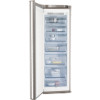AEG A72700GNX0 Product Manual - Page 11
Troubleshooting
 |
View all AEG A72700GNX0 manuals
Add to My Manuals
Save this manual to your list of manuals |
Page 11 highlights
This appliance contains hydrocarbons in its cooling unit; maintenance and recharging must therefore only be carried out by authorized technicians. 6.2 Periodic cleaning The equipment has to be cleaned regularly: • clean the inside and accessories with lukewarm water and some neutral soap. • regularly check the door seals and wipe clean to ensure they are clean and free from debris. • rinse and dry thoroughly. Do not pull, move or damage any pipes and/or cables inside the cabinet. Never use detergents, abrasive powders, highly perfumed cleaning products or wax polishes to clean the interior as this will damage the surface and leave a strong odour. Clean the condenser (black grill) and the compressor at the back of the appliance ENGLISH 11 with a brush. This operation will improve the performance of the appliance and save electricity consumption. Take care of not to damage the cooling system. Many proprietary kitchen surface cleaners contain chemicals that can attack/ damage the plastics used in this appliance. For this reason it is recommended that the outer casing of this appliance is only cleaned with warm water with a little washing-up liquid added. After cleaning, reconnect the equipment to the mains supply. 6.3 Defrosting Your appliance is frost free. This means that there is no buildup of frost when it is in operation, neither on the internal walls nor on the foods. The absence of frost is due to the continuous circulation of cold air inside the compartment, driven by an automatically controlled fan. 7. TROUBLESHOOTING During operation of the appliance some smaller but annoying trouble can often occur, which does not require calling a technician out. In the following chart information is given about them to avoid unnecessary charges on service. The operation of the appliance goes with certain sounds (compressor and circulating sound). This not means a trouble, but a normal operation. The appliance operates discontinuously, so the stopping of compressor does not mean being no current. That is why you must not touch the electrical parts of the appliance before breaking the circuit. Problem Possible cause Solution The appliance is noisy. The appliance is not supported properly. Check if the appliance stands stable (all feet and wheels should be on the floor). Refer to "Levelling".















